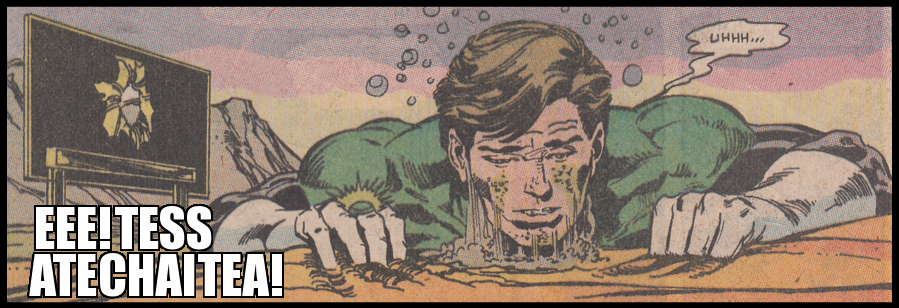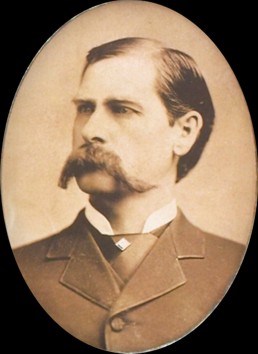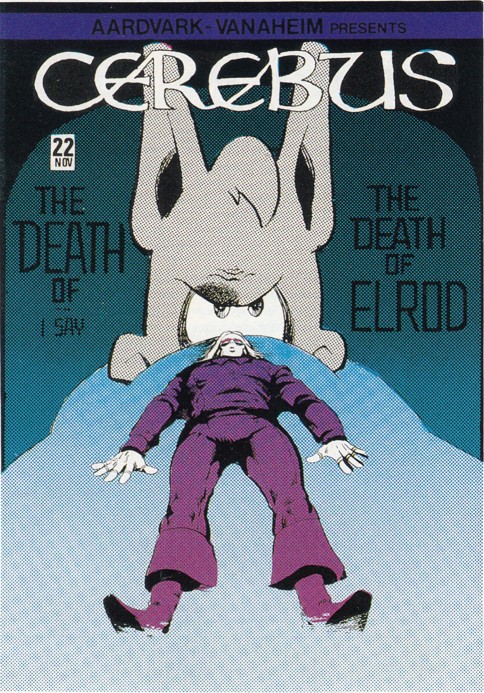
Spoiler Alert: Elrod is a fictional character. No, I know that's not a spoiler! But it actually is so I apologize. You'll understand later.
There's probably some kind intelligence test (not really. But maybe there should be?) that ranks your intelligence based on which character from Cerebus you find the most funny. You're probably super duper smart if you say Oscar Wilde (or whatever his name is in this comic). After that, Lord Julius probably shows you're pretty intelligent. Maybe Cockroach is up there because people on the Internet often mistake referencing pop culture as a joke and The Roach references a whole lot of pop culture. Way down at the stupid pile on the bottom are probably the McGrew Brothers. The character I find the funniest, which probably puts me at below average intelligence, is Elrod. Obviously if you pick Jaka, you're a misogynist and if you pick Pud Withers, you're a sociopath. I know those aren't levels of intelligence but if you pick a non-funny character in a test asking to pick a funny character, there's something fucking wrong with you.
Spoiler Alert #2: Elrod dies in this issue. No, that's not the spoiler since he died at the end of the last issue (or was about to and then the next time bit said "Next month: The Death of Elrod"? It's been too long since I read Issue #21!) and if you looked at the cover, it says "The Death of, I say, the Death of Elrod." The actual spoiler is that Elrod becomes Deadalbino, a parody of Neal Adams' Deadman comic. I'm putting this spoiler here because Dave talks a little bit about it in his Swords of Cerebus essay:
Spoiler Alert #2: Elrod dies in this issue. No, that's not the spoiler since he died at the end of the last issue (or was about to and then the next time bit said "Next month: The Death of Elrod"? It's been too long since I read Issue #21!) and if you looked at the cover, it says "The Death of, I say, the Death of Elrod." The actual spoiler is that Elrod becomes Deadalbino, a parody of Neal Adams' Deadman comic. I'm putting this spoiler here because Dave talks a little bit about it in his Swords of Cerebus essay:
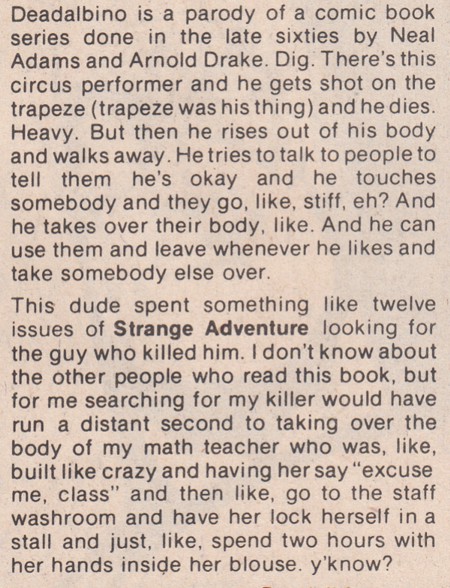
Judging by Dave Sim's Deadman "to-do" list, I'm guessing he'd ask for the worst genie wishes as well.
So Dave Sim, as Deadman, would take over a woman and play with her boobies for two hours? Okay, fine. I'm taking him literally because I want to think of him as a prude even though I'm sure he's cleaning it up for this comic book he's selling to the public. Who would want to read his actual fantasies of taking over his math teacher? It would probably be disgusting based on what my fantasy would be! I'm only going on record and saying that I would fill all of my holes with penises because this is a totally imaginary situation and it could never happen. But if it could happen, and this is a huge problem for the character Deadman, it's fucking rape. Even when Boston Brand takes over somebody's body and doesn't fiddle with their private bits, it's rape. He's penetrating their psyche without consent! Not to mention how easily he could get somebody killed! What if he grabs some peanuts while inside somebody and discovers they're allergic?! And how often did he enter people and start pulling some ridiculous parkour stunt bullshit, completely endangering their lives?! He doesn't know how frail their knees might be! And I know it could only happen off-panel, but you know he did Sim's math teacher fantasy with way more than one woman! How could he not?! Dead people get horny too!
Here's what I'd do: I'd take over the math teacher and make her write on her chalkboard, "I'm a ghost that can take over your body. I just did it to write this message. Do you want to fuck?" Then she'd probably read the message and moan, "Oh baby! I am so turned on by Fickengeists! Let's do this!" And then boom! She'd be in the bathroom stall touching her boobies like crazy!
The issue begins with Elrod getting killed, becoming a ghost, and taking control of the Sopai assassin. Cerebus has been unconscous through all of this but when he wakes up, he doesn't care about how he survived. He just wants to get back to his war with Palnu that he thinks is still somehow going on even though he's no longer anywhere near the vicinity.
Here's what I'd do: I'd take over the math teacher and make her write on her chalkboard, "I'm a ghost that can take over your body. I just did it to write this message. Do you want to fuck?" Then she'd probably read the message and moan, "Oh baby! I am so turned on by Fickengeists! Let's do this!" And then boom! She'd be in the bathroom stall touching her boobies like crazy!
The issue begins with Elrod getting killed, becoming a ghost, and taking control of the Sopai assassin. Cerebus has been unconscous through all of this but when he wakes up, he doesn't care about how he survived. He just wants to get back to his war with Palnu that he thinks is still somehow going on even though he's no longer anywhere near the vicinity.
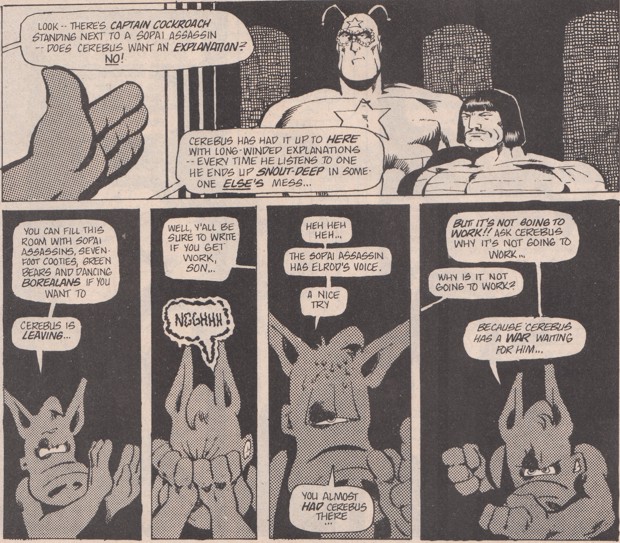
Cerebus doesn't understand that he's the nexus of chaos and it's everybody else who gets pulled into his messes.
I understand that part of what makes Cerebus the nexus of chaos in this comic book is that he's the protagonist. Any chaos that happens when Cerebus isn't around isn't likely to make it into the pages of the comic book, unless they somehow relate to something Cerebus is up to. Like when you get a scene of Serna having Cirin's mouth sewn shut or pages and pages and pages of Oscar Wilde dying. Sure, Cerebus is sitting right out front but he's not really doing anything. Even when he takes a break from being the protagonist, the story presented needs to happen near him. Unless it's memories of Jaka's childhood! But then that's a story being written by the Oscar who is kind of Oscar Wilde but not the one who dies in the following story. I don't think. Maybe?
I suppose if Cerebus wasn't a nexus of chaos, the story would get kind of boring. It's a good thing Dave Sim's God created a chaotic little aardvark whose adventures Dave Sim could transcribe.
Cerebus soon learns that his army was replled by Palnu's forces and slaughtered. That's when he resigns himself to be a part of Weisshaupt's weirdness.
Weisshaupt makes a bunch of plans that involve Deadalbino taking over various high profile government officials and then he names Cerebus "Secretary of the Interior," a job which with a list of responsibilities that make sense, as opposed to when he was Kitchen Staff Supervisor. Although if you look past Lord Julius's confusing way of governing, Cerebus's job really hasn't changed: he's to drink and gamble and threaten people who speak out against his boss.
Weisshaupt's plan completely falls apart because he's relying on Elrod. I suppose Cerebus could have warned him but Cerebus was already drunk with power in his new position that would give him the power to always be drunk. Deadalbino sneaks back into his own body and suddenly he's no longer Deadalbino. He's just Elrod again. Cerebus leaves Weisshaupt to be caught by the guards and he escapes for another adventure. But he'll be back to politics soon. Like in just a few more issues.
Cerebus #22 Rating: B+. Cerebus gets another taste of politics in the Weisshaupt story line, his second toe-dipping since working for Lord Julius. Most of it isn't to his liking but he's definitely attracted to the luxurious amount of free time he can drink in relative safety. He's come a long way from his barbarian roots and his belief that he needs to raise an army of other barbarians to take over some major city which would give him a luxurious amount of free time to drink in relative safety. He's still trying to learn the best way to not have to do anything but drink and gamble and not have to answer to anybody else. It's the basic foundational dream for everybody's dreams, right? Just give me free time to do what I want without anybody bothering me. So Dave Sim wrote a comic book about a person who wants to be able to do whatever they want without anybody bothering them which allowed Dave Sim to do whatever he wanted without anybody bothering him. He even learns the lesson so well that he divorces his wife, probably because she was bothering him. Then he outrages a large percentage of his female readers, probably because they were bothering him. Then he alienates a large percentage of his fan base by writing month after month of religious arguments, and not fictional religious arguments dealing with Tarim (or Terim?!) but real life theology dealing with the three big religions of the People of the Book! Because while Dave was converted by—um, I don't know—himself, Cerebus was converted by Rick. Sort of. Anyway, Dave probably alienated those readers because they were bothering him! Now he's got just the right number of people in his audience that he feels comfortable! It's not as many as when he was writing hilarious jokes like Elrod in a barrel pretending to be a mouse! But the ones that are still there are worth way more than all the ones that made him a superstar comic book artist. They were just too stupid to realize what they wanted was a comic book about the life of an aardvark that ends with him explicating The Bible, falling out of bed, and going straight to Hell with all the other sinful characters who weren't Rick.
I suppose if Cerebus wasn't a nexus of chaos, the story would get kind of boring. It's a good thing Dave Sim's God created a chaotic little aardvark whose adventures Dave Sim could transcribe.
Cerebus soon learns that his army was replled by Palnu's forces and slaughtered. That's when he resigns himself to be a part of Weisshaupt's weirdness.
Weisshaupt makes a bunch of plans that involve Deadalbino taking over various high profile government officials and then he names Cerebus "Secretary of the Interior," a job which with a list of responsibilities that make sense, as opposed to when he was Kitchen Staff Supervisor. Although if you look past Lord Julius's confusing way of governing, Cerebus's job really hasn't changed: he's to drink and gamble and threaten people who speak out against his boss.
Weisshaupt's plan completely falls apart because he's relying on Elrod. I suppose Cerebus could have warned him but Cerebus was already drunk with power in his new position that would give him the power to always be drunk. Deadalbino sneaks back into his own body and suddenly he's no longer Deadalbino. He's just Elrod again. Cerebus leaves Weisshaupt to be caught by the guards and he escapes for another adventure. But he'll be back to politics soon. Like in just a few more issues.
Cerebus #22 Rating: B+. Cerebus gets another taste of politics in the Weisshaupt story line, his second toe-dipping since working for Lord Julius. Most of it isn't to his liking but he's definitely attracted to the luxurious amount of free time he can drink in relative safety. He's come a long way from his barbarian roots and his belief that he needs to raise an army of other barbarians to take over some major city which would give him a luxurious amount of free time to drink in relative safety. He's still trying to learn the best way to not have to do anything but drink and gamble and not have to answer to anybody else. It's the basic foundational dream for everybody's dreams, right? Just give me free time to do what I want without anybody bothering me. So Dave Sim wrote a comic book about a person who wants to be able to do whatever they want without anybody bothering them which allowed Dave Sim to do whatever he wanted without anybody bothering him. He even learns the lesson so well that he divorces his wife, probably because she was bothering him. Then he outrages a large percentage of his female readers, probably because they were bothering him. Then he alienates a large percentage of his fan base by writing month after month of religious arguments, and not fictional religious arguments dealing with Tarim (or Terim?!) but real life theology dealing with the three big religions of the People of the Book! Because while Dave was converted by—um, I don't know—himself, Cerebus was converted by Rick. Sort of. Anyway, Dave probably alienated those readers because they were bothering him! Now he's got just the right number of people in his audience that he feels comfortable! It's not as many as when he was writing hilarious jokes like Elrod in a barrel pretending to be a mouse! But the ones that are still there are worth way more than all the ones that made him a superstar comic book artist. They were just too stupid to realize what they wanted was a comic book about the life of an aardvark that ends with him explicating The Bible, falling out of bed, and going straight to Hell with all the other sinful characters who weren't Rick.
